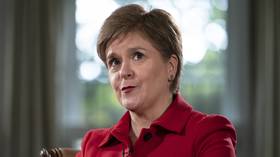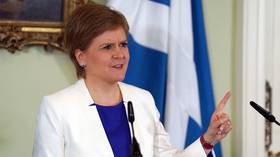EU officials contradict Scottish nationalist leader over euro

Scotland will have to “legally commit” to joining the euro if it gains independence and pursues membership of the European Union, two EU officials have told the Herald on Sunday. Scottish First Minister Nicola Sturgeon, who is leading the move for independence, previously insisted that the country would be in charge of its own currency.
Taking an independent Scotland into the EU is a core goal of Sturgeon’s Scottish National Party (SNP), which is currently seeking a second – albeit non-binding – referendum on leaving the United Kingdom next October. However, Sturgeon insisted last week that Scotland would not have to adopt the euro as its currency, stating that it would continue using the British pound before moving to its own Scottish pound.
Sturgeon’s conservative opponents argued otherwise, and multiple EU officials have now confirmed this, telling the Herald on Sunday that the euro would be non-negotiable.
“All EU member states, except Denmark which has an opt-out clause, are legally committed to join the euro area once they fulfil the necessary conditions,” an economic affairs spokeswoman at the European Commission told the newspaper.
European Policy Centre chief Dr. Fabian Zuleeg added that newcomers to the bloc wouldn’t be granted the same opt-out that Denmark negotiated. “It would be much harder, if not impossible, for a new member to negotiate such a permanent opt-out,” he said. “However, it might be possible to negotiate essentially a grace period.”
The United Kingdom also enjoyed such an opt-out when it was an EU member. While Sturgeon cited Bulgaria, the Czech Republic, Hungary, Poland, Romania and Sweden as member states using their own currencies, the European Commission spokeswoman said that these states are all required to work towards joining the single currency, although “no timetable is prescribed."
Crucially, the euro is currently reeling from the effects of the EU’s sanctions on Russian fossil fuels, and has sat at parity or lower with the US dollar since August – a record low for the two-decade-old currency. While the single currency is performing slightly stronger against the pound compared to last year, it sits at an eight-year low against the Russian ruble and is underperforming relative to the Chinese yuan.













